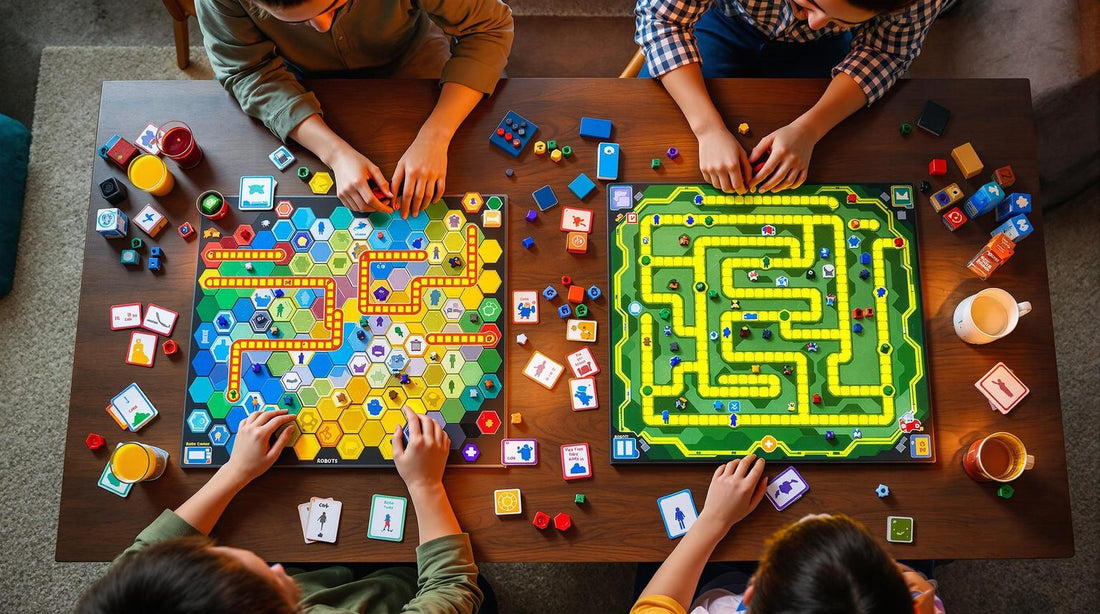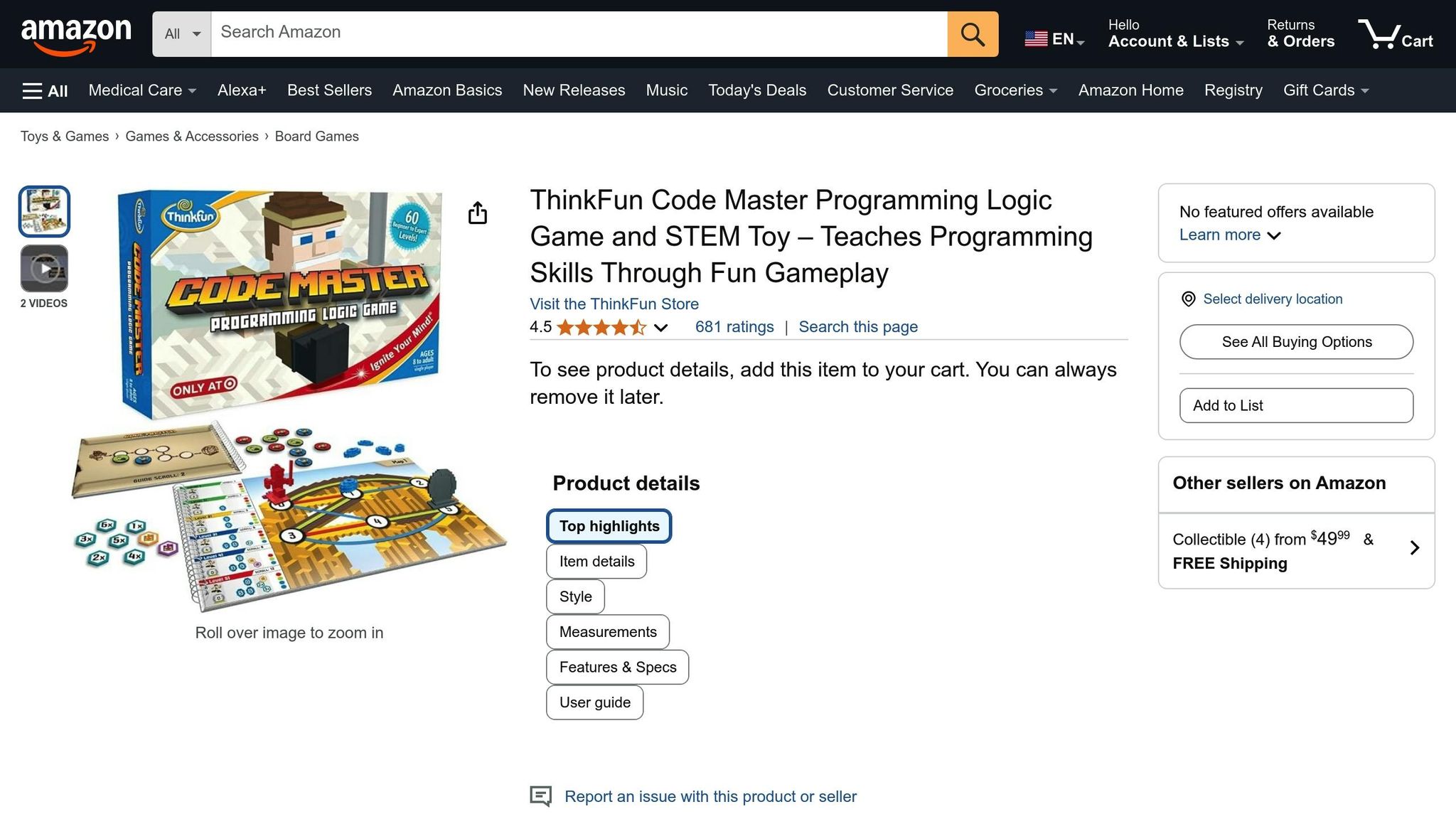Discover the Best Board Games for Every Player

Code Master vs. Robot Turtles: Which Game Wins?
Looking for the best game to teach kids programming? Here's a quick breakdown:
- Code Master: A single-player puzzle game that teaches logical thinking, algorithms, and problem-solving. Best for older kids ready for independent challenges.
- Robot Turtles: A multiplayer board game introducing basic coding concepts like sequencing and debugging through collaborative play. Ideal for younger kids and group settings.
Quick Comparison:
| Feature | Code Master | Robot Turtles |
|---|---|---|
| Game Type | Single-player puzzle | Multiplayer board game |
| Difficulty Level | Intermediate | Beginner |
| Learning Style | Independent | Collaborative |
| Core Focus | Advanced programming logic | Basic coding concepts |
| Best For | Older kids (8+) | Younger kids (4-8) |
Choose Code Master for a deeper, solo learning experience or Robot Turtles for an engaging, group-friendly introduction to coding. Both games are great tools to build programming skills at different stages.
How Each Game Works
Code Master Basics

Code Master is a single-player puzzle game designed to test your logical thinking. Players solve puzzles step by step, creating solutions that reflect programming principles. This game focuses on building problem-solving and algorithmic skills. Unlike Code Master, which is a solo experience, Robot Turtles brings a group dynamic into play.
Robot Turtles Basics

Robot Turtles is a multiplayer game that introduces programming concepts through teamwork. Players work together to create command sequences that guide turtles on the board. This setup emphasizes communication and collaborative problem-solving, making it a fun and interactive way to learn.
Learning Benefits
Programming Skills Taught
The two games approach programming education in distinct ways. Code Master focuses on puzzles that require logical thinking and more advanced problem-solving. It introduces:
- Sequential logic: Creating step-by-step solutions, similar to programming workflows
- Conditional statements: Using "if-then" decisions based on specific conditions
- Loop structures: Identifying patterns and designing repeatable sequences
On the other hand, Robot Turtles simplifies programming basics with straightforward commands, teaching:
- Basic commands: Moving forward or turning
- Program planning: Organizing command cards to execute actions
- Debugging: Correcting moves immediately during gameplay
Here’s a quick comparison of the two:
| Programming Concept | Code Master | Robot Turtles |
|---|---|---|
| Difficulty Level | Intermediate | Beginner |
| Core Focus | Problem-solving algorithms | Basic command sequences |
| Learning Style | Individual discovery | Guided, collaborative play |
| Debugging Method | Iterative trial and error | Interactive correction |
| Concept Application | Abstract puzzles | Visual, movement-based actions |
Age Groups and Skill Levels
When deciding between the two, it’s important to consider the age group and experience level of the child.
Code Master is better suited for older elementary kids who are ready for independent, more challenging puzzles. Robot Turtles, on the other hand, is perfect for younger beginners, especially when guided by an adult.
Together, these games create a well-rounded learning journey. Robot Turtles introduces essential directional and planning skills, while Code Master builds on that foundation with increasingly complex challenges. This progression makes both games excellent tools for nurturing programming skills at different stages of a child’s learning.
Player Experience
Fun and Player Interest
Each game offers a distinct experience, thanks to its unique mechanics. Code Master engages players with a series of puzzles that become progressively harder, rewarding individual problem-solving and encouraging players to tackle the next challenge. The feedback players receive after completing each puzzle adds to the satisfaction and drives them forward.
On the other hand, Robot Turtles focuses on social, interactive gameplay. One player gives instructions while another carries them out, creating a collaborative dynamic. The hands-on aspect, like moving game pieces, makes it especially appealing to younger players who enjoy tactile learning experiences.
Younger audiences are often drawn to Robot Turtles' social and physical elements, while older players tend to prefer the more complex puzzles of Code Master. Both games, however, offer elements that keep players engaged beyond the initial excitement.
Long-term Play Value
Replayability is a strong point for both games, though they achieve it in different ways. Code Master features a level progression system with a variety of puzzles, ranging from simple to advanced. The puzzles are designed so solutions aren’t easily memorized, making each playthrough feel new and challenging.
Robot Turtles uses a modular setup to sustain interest. Players can mix and match different types of cards, from basic movement cards to more advanced ones, allowing the game to evolve alongside the player's skill level. While its mechanics may eventually feel too simple for some, it remains a great choice for group settings like family game nights or classrooms, where collaboration enhances the experience.
Both games retain their educational appeal through repeated play. Code Master is perfect for those who enjoy deep, individual problem-solving, while Robot Turtles shines in cooperative and interactive environments.
sbb-itb-1ed942f
How To Play: Robot Turtles
Direct Comparison
When comparing the two games, their teaching methods and focus areas stand out. Here's a breakdown of their differences and how each game approaches programming education.
Feature Comparison Chart
| Feature | Code Master | Robot Turtles |
|---|---|---|
| Game Type | Single-player puzzle | Multiplayer board game |
| Core Mechanics | Sequential logic with conditional steps | Visual programming using code cards |
| Player Interaction | Individual problem-solving | Collaborative play |
| Programming Concepts | • Conditional logic • Sequential programming |
• Basic sequencing • Simple commands • Visual programming • Debugging basics |
| Game Components | Maze setup featuring crystal collection and obstacle avoidance | Board, turtle pieces, and code cards |
| Educational Focus | Logical deduction and structured problem-solving | Introduction to coding basics |
Code Master is designed for players who enjoy tackling puzzles independently. It focuses on advanced thinking skills, requiring players to use conditional logic and sequential steps to navigate mazes, collect crystals, and avoid obstacles.
On the other hand, Robot Turtles introduces programming in a more interactive and social way. Players guide turtle pieces using code cards, offering immediate visual feedback. This setup encourages collaboration and helps beginners understand basic coding ideas like sequencing and debugging.
Final Assessment
Let's break down the best scenarios and player profiles for each game, based on their unique gameplay and educational focus.
Best Uses and Players
Code Master is ideal for individuals who enjoy working through puzzles on their own. Its step-by-step progression helps players gain a stronger grasp of advanced coding principles through independent problem-solving.
Robot Turtles is designed for beginners, offering a colorful and collaborative experience. Its simple gameplay introduces programming basics in a group setting, making it perfect for younger learners or family playtime.
Which Game to Pick
Your choice depends on your goals and setting:
- Code Master: A great option for those seeking a challenging, self-directed learning experience that dives into more advanced coding ideas.
- Robot Turtles: Perfect for an engaging, interactive introduction to coding, especially in a collaborative environment.
When deciding, think about whether you want to focus on building foundational skills through teamwork or advancing programming knowledge with progressively harder challenges. Both games provide valuable tools for learning coding fundamentals and can fit into different teaching or parenting strategies.






